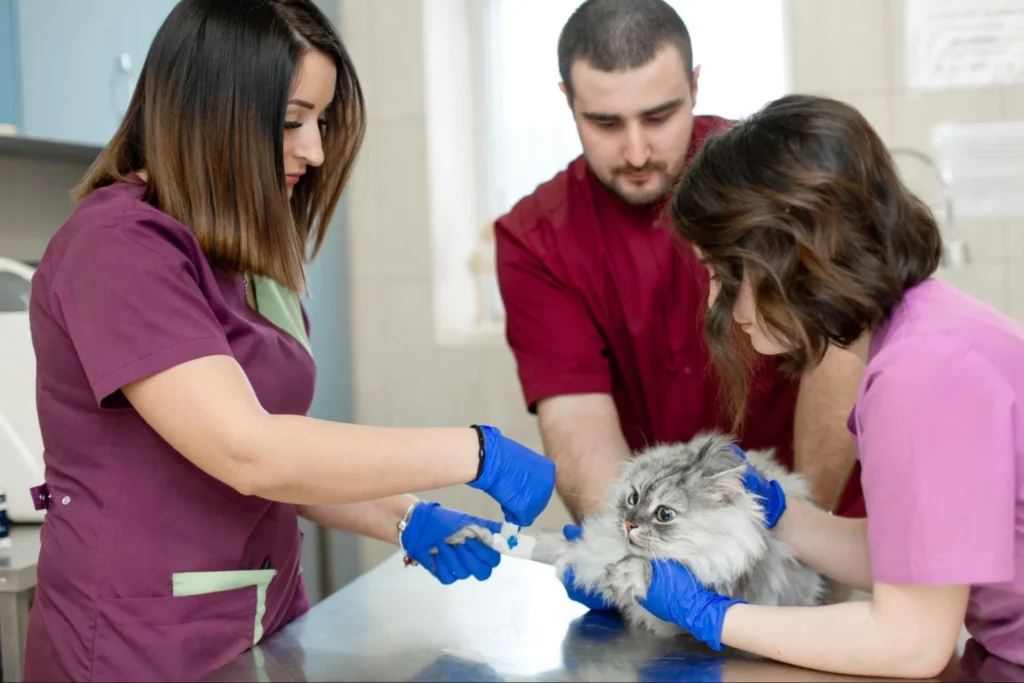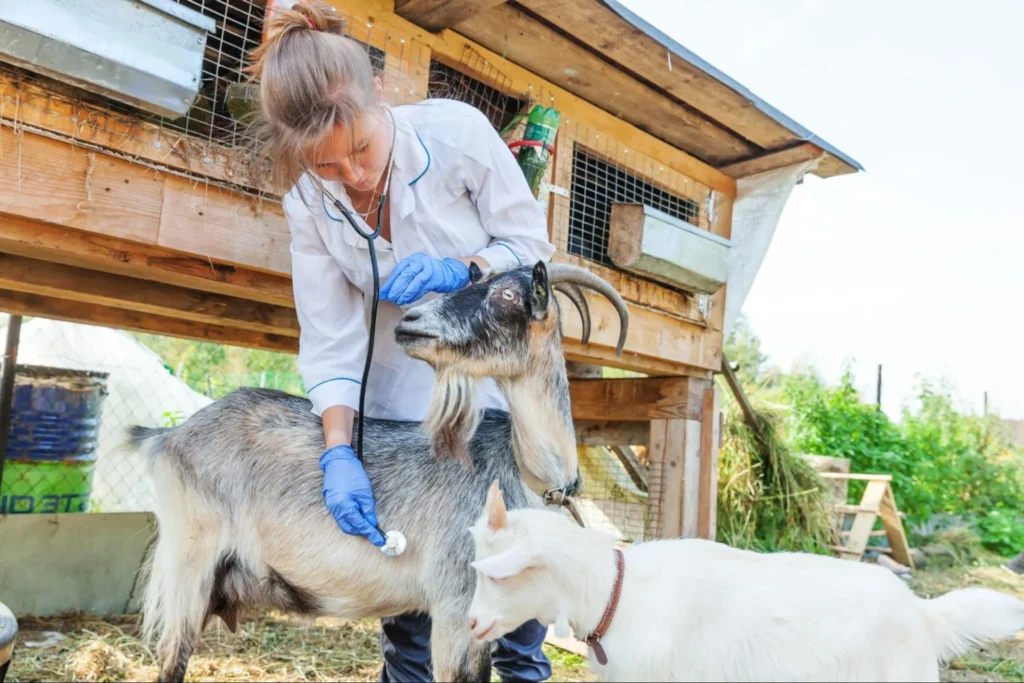About the Writer
Common Vet School Application Mistakes [& How to Avoid Them]

Applying to vet school is a competitive and challenging process. With different requirements, deadlines, and expectations for each program, applicants are under pressure to meet all criteria and avoid mistakes.
The vet school application mistakes we’ll be discussing can have a big impact on your chances of acceptance.
Being aware of them and learning how to avoid them will strengthen your application and help you move a step closer to your goal of becoming a veterinarian.
1. Not Following Application Directions
A common vet school application mistake is not carefully following the required guidelines and submission instructions.
Each school has specific requirements you can find in the application guidelines.
At Colorado State University, all prerequisite courses, including ones in progress, must be correctly assigned within the application. If a required course is missing, the school may assume you have not completed it, potentially disqualifying your application.
Even smaller oversights may delay your application or prevent it from being reviewed, and all your hard efforts could go to waste.
How To Avoid
Don’t miss out on any vet school opportunities by carefully reviewing each school’s application requirements, deadlines, and submission formats.
You can also make a checklist for every application to ensure you have all the required documents.
Before submitting your application, be sure to double-check for any missing information or incorrect file uploads.
The VMCAS (Veterinary Medical College Application Service) application deadline for 2025 is September 16 at 11:59 P.M Eastern Time. Be sure to submit your materials before this time to avoid any processing delays.
Tip: Starting early gives you plenty of time to thoroughly review everything and avoid last-minute mistakes.
2. Misjudging Which Vet Schools Are Right for You
There are 33 vet schools in the U.S., each with different requirements and specializations. Without doing enough research on these schools, you may apply for ones that aren’t a good fit.
Some schools could have high GPA or test score requirements that would make acceptance highly competitive. Others, while highly prestigious, may not offer the specific programs you’re looking for.
If you end up wasting your time applying to schools that don’t align with your qualifications or interests, you risk missing out on better-suited programs where you could have had a stronger chance of acceptance and a more fulfilling veterinary education.
How To Avoid
Make a strategic selection with the help of our guide to choosing the best vet program for your goals.
Generally, you should be asking yourself questions related to each vet school’s:
- Academic Fit – Do you have the necessary GPA and other qualifications to be accepted into the school?
- Available Programs – Does the school have a focus on your area of interest, such as wildlife medicine, small animals, or research?
- Location – Are you willing to relocate to where the school is based?
- Cost – Can you afford the tuition and living expenses?
Remember not to rush your decision, as the school you apply to will shape your future experience and career opportunities. Do as much research as you can.
Looking for the perfect veterinary school that fits your qualifications and career aspirations? Try VetMed Match, a personalized service designed to connect you with optimal programs that will help you launch your career as a vet.

3. Not Meeting Academic Requirements
Some schools will not consider your application if you have below a certain GPA or too many incomplete prerequisite courses.
What GPA Do I Need for Vet School?
The GPA requirements for veterinary schools can vary, but most expect a minimum GPA of 3.0.
Here are some veterinary schools and their GPA requirements:
- University of Florida – 3.0
- University of Georgia – 3.0
- Mississippi State University – 3.0
- University of Missouri – 3.0
- North Carolina State University – 3.4 (3.0 for NC residents)
How To Avoid
If you have a lower GPA, you still have a chance of being accepted into some schools, such as The UC Davis School of Veterinary Medicine, which only requires a 2.5 GPA.
With several schools, such as The University of Pennsylvania School of Veterinary Medicine, there isn’t a specific GPA needed to apply. Instead you’re just recommended to have at least 3.0 or above, along with the recommended amount of experience (600 hours).
Go through and check school’s requirements to find those that have lower GPA requirements.
Fortunately, there are still ways to strengthen your application, such as:
- Retaking courses to improve your GPA
- Going back to school and enrolling in advanced science classes
- Studying hard for the GRE (if used in your chosen school’s admissions process)
You can also explain in your personal statement how you adapted to overcome academic challenges, showing your resilience and determination. With concrete examples, you can demonstrate your ability to handle the demands of veterinary school despite a less-than-perfect academic performance.
4. Not Writing a Strong Personal Statement
As part of the veterinary school application process, you’ll need to submit a personal statement. This is your opportunity to showcase your personality, passion, and unique qualities beyond just grades and qualifications.
It allows you to explain why you’re a strong candidate for the program, what motivates you to pursue veterinary medicine, and how your experiences have prepared you for this career.
But, while the personal statement is your chance to stand out, you may make some mistakes that weaken your application and fail to leave a good impression.
Common mistakes applicants make in their personal statement include:
- Writing a disorganized essay with no focus
- Using generic statements without any additional insight
- Stating qualifications without proving any examples
- Using poor grammatical and spelling errors
- Not adhering to school-specific requirements
For example, saying you’ve “loved animals ever since I was a child” and that you’re “a hard-working team player” won’t make any impact on the person reviewing your application.
Without depth or specificity, you may appear unprepared, insincere, or not serious enough about the school’s program.
How To Avoid
Read our guide to writing a strong vet school personal statement to see detailed information and examples for each stage of the process.
For now, here’s some general advice:
- Review different vet school requirements to ensure your statement aligns with their expectations. This includes checking for specific prompts, word limits, and formatting guidelines.
- Instead of stating qualities like “I’m passionate” or “I’m dedicated,” use specific experiences and examples to demonstrate these traits in action.
- Proofread the statement to remove typos and grammatical mistakes.
- Maintain a clear structure with an introduction, paragraphs, and a brief closing statement.

Providing Weak Letters of Recommendation
Most veterinary schools require letters of recommendation to validate each applicant’s credibility. Unlike the rest of your application, which is written by you, your letter of recommendation comes from someone else attesting to your qualifications and character.
These letters can be written by anyone who can vouch for your abilities and experience.
According to VMCAS guidelines, writers should describe their relationship with the applicant, highlight two strengths and any areas for improvement, and provide specific examples demonstrating commitment to veterinary medicine.
A ‘weak’ letter of recommendation will likely not strongly support your application or set you apart from other candidates. It may lack examples of your skills and strengths or appear too vague and generic.
How To Avoid
Although you’re not writing the letter of recommendation yourself, you still have some control over how it is written and presented.
First, you’ll need to choose the right recommender. Consider mentors, supervisors, or professors you’ve had positive professional or academic experiences with. They should be able to provide an objective and unbiased evaluation, so avoid selecting family members or close friends.
Ask your recommender if they’d be willing to write the letter for you, and provide them with all necessary formatting guidelines and school-specific requirements.
You can also give them your resume or personal statement to help their recommendation reinforce the key skills and experiences you’ve highlighted in your application, creating a more cohesive and compelling case for your acceptance.
Finally, make sure they include their contact details according to your school’s requirements.
Remember, some schools require several letters of recommendation, so make sure you check the requirements and have enough letters submitted on time.
Tip: For those applying through the VMCAS, all recommendation letters are due by September 15th (ET) at 11:59 pm.
6. Not Preparing for Interviews
The final hurdle in many vet school application processes is the interview stage. Most schools use the interview as the final deciding factor in the admissions process, where they want to see your professionalism and genuine enthusiasm for the veterinary program.
Many applicants underestimate this stage, assuming that their grades and experience will speak for themselves.
However, failing to prepare for your interview can leave a weak final impression on the admissions committee. You may come across as lacking problem-solving skills or not having a deep understanding of the profession, which can raise doubts about your readiness for veterinary school.
How To Avoid
Start by researching common interview questions.
Be ready for both traditional questions, such as “Why do you want to be a veterinarian?” and more focused prompts that ask you to reveal past experiences, like “Describe a time you worked through a challenging situation”
Practice your answers, but avoid memorizing them word-for-word. You don’t want to appear too stiff or unnatural.
You should also research your chosen school’s curriculum, as this shows your genuine interest in their program and helps you tailor your responses during the interview. For example, if a school emphasizes hands-on clinical experience in the program, you can express your enthusiasm for gaining practical skills.
With your veterinary school interviews, the more you prepare, the better. Do as much research and mock interviews as you can.
Final Thoughts: Taking the Next Steps in Your Veterinary Career
Applying to veterinary programs is a defining moment in your career. By avoiding common vet school application mistakes, you can stand out from other applicants and maximize your chances of acceptance.
At Vetucore, we’re dedicated to helping aspiring veterinarians like you succeed by providing expert guidance, resources, and career-building opportunities. Our services include consultations that offer strategic advice on applications and interviews to help you confidently navigate the admissions process.
Book a call with us now to set your veterinary career on the right path.
Veterinary School Application FAQs: Be Fully
Prepared
Having the right information at your fingertips can make your vet school application process much smoother and less stressful.
Check out these answers to common questions to avoid any unexpected surprises along the way:
Is it hard to get accepted to vet school?
Yes, getting accepted into vet school is highly competitive. There are a limited number of veterinary schools in the U.S., and with large pools of applicants, many programs have acceptance rates between 10 – 15%.
Do I need veterinary experience for vet school?
Yes, most vet schools require applicants to have veterinary experience before applying.
Competitive applicants typically have at least 500 – 1,000 hours, which can be gained through volunteering at a vet clinic or animal shelter, working as a veterinary assistant, shadowing veterinarians, among other hands-on animal care experiences.
How many vet schools should I apply to?
It’s up to you how many veterinary schools you apply to. Many applicants apply to 5–10 schools.
Applying to more schools can increase your chances of getting accepted into one. But don’t spread yourself too thin, as you may end up with too many applications to balance, and each one might not be as strong as it could be.
How early should I start preparing my vet school application?
It’s important to stick to a vet school application timeline early so you don’t end up rushing.
Most veterinary schools use the VMCAS, which typically opens in late January and closes in mid-September.
However, some may have their own vet school application deadline, so be sure to check the specific dates for your chosen programs.
